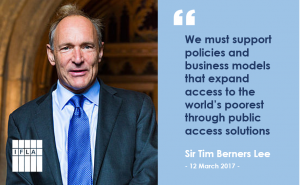
Sir Tim Berners-Lee Quote (adapted from photo by Paul Clarke, CC-BY-SA 4.0 https://nl.wikipedia.org/wiki/Tim_Berners-Lee#/media/File:Sir_Tim_Berners-Lee.jpg)
On 12 March, the World Wide Web turned 29. Rather than a birthday card, its father, Tim Berners-Lee, wrote a letter to the world, setting out his hopes, and his concerns for his creation.
Clearly on the positive side, this has been the year that the share of the world’s population using the Internet passed 50% for the first time. Given a rising population, this is not insignificant.
But Sir Tim highlighted worries also. The dominance of a number of platforms, he suggests, will not work in favour of innovation. Yet when it comes to dealing with criminal activity online – or greyer areas such as deliberate misinformation (fake news) – they are often the only ones with the capacity to act.
He makes two points which will be welcome for libraries – about the importance of public access, and the importance of a Web that works for everyone.
The Other Half
Compared to the spread of postal services, aviation or telephones, the spread of the Internet has been very quick. To go from zero to nearly 4 billion people in less than 30 years is more than spectacular.
Yet as digital technologies become more and more central in the production of – and access to – information, knowledge, and culture, the costs of being on the wrong side of the digital divide grow.
Sir Tim recognises this, and calls for urgent action to bring the remaining 4 billion online. In this, he highlights the importance of public access.
This is a key strength of libraries, and increasingly a core part of their overall mission to provide access to information.
Public access (as opposed to home, ‘private’ access) can provide a stepping stone for those who cannot (yet) afford their own device or subscription. It may be the thing that allows them to get a job, or develop the business idea, that allows them to pay for home access in future.
But even in societies with widespread connectivity already, public access is a complement to private access. Those sharing a computer with family members may not want to look up certain information, if this is likely to lead to certain search results or adverts showing up later. People may also prefer social access – going online with friends or peers.
Finally, public access is there for those who, by choice or necessity, will never have their own connection. Any government serious about guaranteeing the rights of all of its citizens must bear this in mind.
Libraries provide public access – and often the hardware necessary to enjoy it – in a safe and welcoming environment, often integrated with other valued services. For precisely those groups most likely to be offline – minorities, women, the less well-off, they are essential.
The Web We Want
Sir Tim highlights his desire to ensure that a broader range of stakeholders – including of course the Internet’s users – have a say in where his creation goes.
He calls for ambition, both around the operation of platforms, and the idea that advertising alone can power the Internet.
IFLA itself has set outs its overall vision for the Internet in its Manifesto, first in 2002, and with an update in 2014. Libraries clearly recognise the important role platforms play – and their need to be shielded from unreasonable liability for the actions of their users.
Similarly, they should not be left – or required – to regulate the Web, as set out in both the Statement on the Right to be Forgotten (2016), and IFLA’s submission to the Human Rights Council on digital content regulation (2017).
But there is a third element – giving people the skills they need to take a critical – and proactive approach to the Internet. For IFLA, this not only provides an answer to many of the fears around fake news, but allows users to get the most out of the web.
Moreover, in response to Sir Tim’s concern that people need to want to connect, more skilled users will be able, in turn, to create their own content and services, relevant to themselves and their communities.
So, Happy Birthday to the World Wide Web. Next year’s a big birthday, and, we hope, an opportunity to celebrate successes in developing a more universal, more inclusive Internet.
[Correction , 14 March 2018 – we incorrectly referred to 12 March as the birthday of the Internet. It is rather the birthday of the World Wide Web. We have corrected this in the first and last paragraphs of this post)
I just know about this. How can i get more info about Tim Berners-Lee?
Thanks for your question! You can find out about what he’s working on at the moment on his Twitter feed: https://twitter.com/timberners_lee?lang=en. He is also closely associated with a couple of organisations – the Web Foundation (which he co-founded): https://webfoundation.org/about/sir-tim-berners-lee/, and the World Wide Web Consortium (W3C): https://www.w3.org/People/Berners-Lee/. I hope that helps!